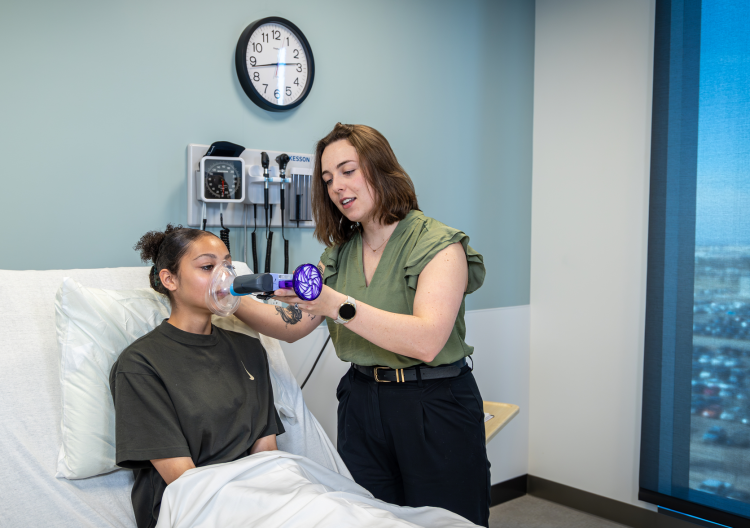AB Nexus announces 2025 grant awards with an emphasis on quantum-focused research collaborations
Program supports multidisciplinary research partnerships between CU Anschutz and CU Boulder

Today, the AB Nexus program announced its 2025 seed grant awards to four research teams from the University of Colorado Anschutz Medical Campus and the University of Colorado Boulder. Collectively, the winning teams will receive $750,000 in funding to advance cutting-edge research that improves human health and well-being.
Founded five years ago, AB Nexus fosters joint-campus research collaborations between CU Boulder and CU Anschutz. By providing funding and resources for interdisciplinary teams of scientists, the AB Nexus program helps to advance new innovations and discoveries while growing CU’s collective research enterprise.
“I believe that bringing together scientists from diverse disciplines is critical to making meaningful progress on complex health problems, and AB Nexus has been instrumental in facilitating these types of research partnerships,” said Thomas Flaig, MD, vice chancellor for research at CU Anschutz. “I’m very proud of this joint effort and how it has catalyzed a culture of scientific collaboration across our campuses.”
Since launching in 2020, AB Nexus has awarded more than $4.95 million in seed funding to 59 research teams, many of which have gone on to secure additional external funding and publish peer-reviewed research papers on a wide range of topics related to health and medicine.
This year, AB Nexus developed two themed “tracks” for grant applications: one for quantum and human health and another “exploratory” track for early-career investigators.
“We are especially excited about this cycle’s dual emphasis on our campuses’ combined capabilities in quantum and health, as well as new opportunities for early-career faculty,” said Massimo Ruzzene, senior vice chancellor for research and innovation and dean of the institutes at CU Boulder. “Each of these tracks focuses on an area of abundant potential at both campuses, providing investment for researchers working to accelerate their discoveries to benefit the medical community and patients as quickly as possible.”
Research topics include colorectal cancer, the microbiome and more

The 2025 AB Nexus awardees include two quantum-focused teams, each receiving a $300,000 seed grant, and two teams of early career scientists, each receiving $75,000 in funding. More details on the teams and their research focus areas can be found below.
Harnessing AI-Quantum Computing for Colorectal Cancer Therapies
Principal Investigators: Daniel LaBarbera, PhD (CU Anschutz) and Karolin Luger, PhD (CU Boulder)
This project uses cutting-edge quantum computing technologies, AI and the resources of the CU Anschutz Center for Drug Discovery to accelerate new treatments for colorectal cancer. By optimizing a promising class of drugs that target a key protein involved in tumor progression, the team aims to improve chemotherapy effectiveness and bring a new therapy closer to clinical trials—all while positioning Colorado as a leader in quantum-powered health innovation.
Using Quantum Sensing to Detect Pneumonia and Asthma in Children
Principal Investigators: Lilliam Ambroggio, PhD (CU Anschutz) and Jun Ye, PhD (CU Boulder)
Using quantum sensing and advanced laser technologies, this project aims to develop a new breath test to help doctors quickly and safely differentiate between bacterial pneumonia, viral infections and asthma in children. By analyzing a child’s breath molecules, the team hopes to improve the process of diagnosis, reduce unnecessary treatments, and create a portable tool for use in hospitals and clinics.
Optimizing Beneficial Fungi to Support Infant Gut Health and Prevent Infection
Principal Investigators: Jennifer Hill, PhD (CU Boulder) and Kyla Ost, PhD (CU Anschutz)
This research explores how certain Candida fungi in the gut can either help or harm babies during early development. By studying two closely related fungal species—one that supports healthy growth and one that can cause infections—the team hopes to understand what makes some microbes beneficial and others dangerous, with the goal of promoting health and avoiding disease.
Studying How Baby Diets Shape Their Microbiomes—and Future Allergy Risk
Principal Investigators: Julia Dunn, PhD (CU Anschutz) and Matthew Olm, PhD (CU Boulder)
This study investigates how different infant diets—vegetarian versus meat-based—shape gut microbes and influence immune cells linked to allergies. By analyzing the impact of different infant fecal samples in animal models, researchers aim to uncover how early-life microbiomes impact inflammation, laying the groundwork for future dietary or probiotic strategies to prevent conditions like food allergies and asthma.
How to apply
The application process for the 2026 AB Nexus grant cycle will be announced this fall on the program’s website.

